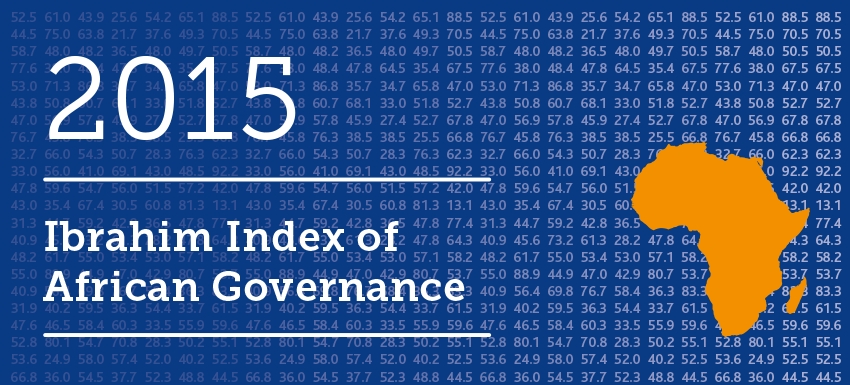
London, 5 October 2015 – The Ibrahim Index of African Governance (IIAG), launched today, indicates
that over the last four years, governance progress in Africa has stalled, and reveals a shifting
landscape. During the period 2011-14, the African average overall governance score in the IIAG
increased only slightly by +0.2 points to 50.1 (out of 100.0), with considerable changes in
performance during the last four years at all levels of the Index, both at country and at category level.
Published annually, the IIAG provides a comprehensive assessment of governance performance for
each of the 54 African countries. The 2015 IIAG consists of 93 indicators which fall into four
categories: Safety & Rule of Law, Participation & Human Rights, Sustainable Economic Opportunity
and Human Development.
Twenty-one countries, including five of the top ten, have deteriorated in overall governance
performance since 2011. Only six countries register an improvement across each of the four categories
of the IIAG: Côte d’Ivoire, Morocco, Rwanda, Senegal, Somalia and Zimbabwe.
At the regional level, the continental trend in overall governance masks varying performances and a
widening range between the regions. Southern Africa remains the best performing region, with an
average score of 58.9, followed by West Africa (52.4), North Africa (51.2) and East Africa (44.3).
Central Africa is the lowest ranking region with an average score of 40.9, and is the only region to have
deteriorated since 2011.
The marginal improvement in overall governance at the continental level is underpinned by positive
performances in only two categories, Human Development (+1.2) and Participation & Human Rights
(+0.7). Both Sustainable Economic Opportunity (-0.7) and Safety & Rule of Law (-0.3) have
deteriorated.
Mo Ibrahim, Chair of the Mo Ibrahim Foundation, says: “While Africans overall are certainly healthier
and live in more democratic societies than 15 years ago, the 2015 IIAG shows that recent progress in
other key areas on the continent has either stalled or reversed, and that some key countries seem to be
faltering. This is a warning sign for all of us. Only shared and sustained improvements across all areas
of governance will deliver the future that Africans deserve and demand.”
Key findings of the IIAG 2015 include:
• The African average score for overall governance in 2014 is 50.1, a slight
improvement since 2011 (+0.2). Over the last four years, only half of the top ten
governance performers managed to improve their overall governance score, and 21 of
the 54 countries have deteriorated.
• The Sustainable Economic Opportunity category exhibits both the lowest
continental average score (43.2) and the largest performance drop since 2011
(-0.7). Sustainable Economic Opportunity includes the most deteriorated sub-category in the
IIAG since 2011, Business Environment (-2.5). This sub-category includes the most
deteriorated indicator in the IIAG over this time period, Soundness of Banks (-11.0).
• Among the generally negative trend of the Sustainable Economic Opportunity category, four
countries, Morocco (+11.2), Togo (+9.5), Kenya (+5.9) and Democratic Republic
of Congo (+5.4), exhibit impressive gains of more than +5.0 points.
• The overall governance score range between the best regional performer, Southern
Africa, and the poorest regional performer, Central Africa, is more than 18.1 points in
2014. This has widened by +1.7 points since 2011.
• With a 79.9 score for overall governance in 2014, Mauritius stands over 70 points higher
than the continent’s weakest governance performer, Somalia, which achieved a score
of 8.5.
• The top three countries, Mauritius, Cabo Verde and Botswana, all exhibit a
decline in overall governance and in at least two of the four components over the last
four years, calling into question whether these countries will continue to dominate the top of
the rankings in future.
• The bottom three countries in overall governance are Central African Republic
(24.9), South Sudan (19.9) and Somalia (8.5). Two of these, South Sudan (-9.6) and
Central African Republic (-8.4), have also registered the most extreme deteriorations, along
with Mali (-8.1).
• The top ten improvers in overall governance over the last four years represent almost a
quarter of the continent’s population. Five of these countries, Senegal (9th), Kenya
(14th), Morocco (16th) Rwanda (11th) and Tunisia (8th), already rank in the top 20 of the IIAG,
leading to the question of whether they might become the continent’s next powerhouses.
• The Ibrahim Index of African Governance (IIAG) provides an annual assessment of the
quality of governance in African countries and is the most comprehensive collection of data on
African governance. The 2015 IIAG combines 93 indicators from 33 independent African and
global data institutions.
• The 2015 IIAG covers a 15-year data period from 2000 to 2014.
• All trends described are for the latest four-year data period, from 2011 to 2014.
• All scores in the IIAG are out of 100.0, with 100.0 being the best possible score.
• The 2015 IIAG covers 54 African countries. For the first time the IIAG also includes
South Sudan and Sudan as there are enough disaggregated data to analyse their
performances, following South Sudan’s secession in 2011.
• Slight annual refinements are made to the IIAG, which may be methodological, or based on
the inclusion or exclusion of indicators. The entire IIAG data set is therefore retrospectively
revised, in accordance with best practice. Comparisons between years should be
performed entirely on the 2015 IIAG data set.
• The Mo Ibrahim Foundation was established in 2006 with a focus on the critical importance
of leadership and governance in Africa. By providing tools to support progress in leadership
and governance, the Foundation aims to promote meaningful change on the continent.
Credit: Mo Ibrahim Foundation








